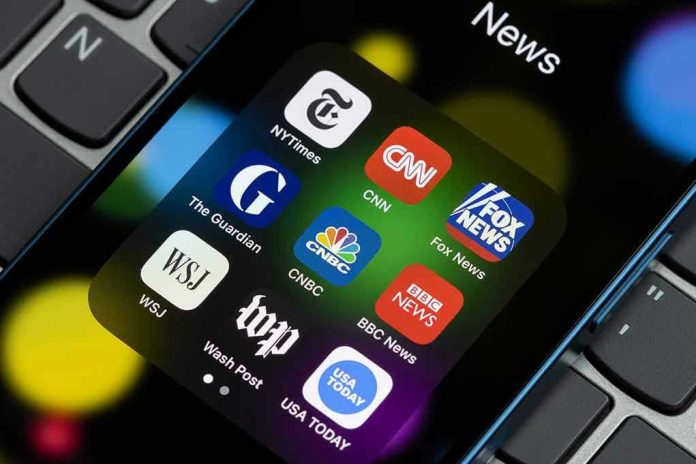
A major Washington Post fact-checker’s admission of grave error over the COVID-19 lab leak theory has reignited outrage over the media’s role in suppressing credible viewpoints and deepened calls for accountability after years of leftist narratives undermining public trust.
Story Snapshot
- Glenn Kessler, former Washington Post fact-checker, admits his 2020 COVID lab leak headline was “completely wrong” and expresses “infinite regret.”
- The Post’s definitive dismissal of the lab leak theory shaped media coverage and public opinion, fueling skepticism of the Trump administration’s warnings.
- Official U.S. intelligence agencies now consider the lab leak both plausible and likely, contradicting early media consensus.
- Kessler’s admission renews calls for independent media oversight and exposes the dangers of politicized fact-checking that erodes constitutional values and transparency.
Definitive Dismissal of Lab Leak Theory Sparked Backlash
In May 2020, the Washington Post published a headline labeling the theory that COVID-19 originated from a Wuhan lab as “doubtful,” cementing a narrative that dismissed concerns raised by the Trump administration and conservatives. Former fact-checker Glenn Kessler authored the piece, which echoed the mainstream scientific consensus and intelligence assessments of the time. This definitive framing, however, went beyond the article’s content, a fact Kessler later admitted was a significant editorial overreach. The Post’s approach not only influenced broader media coverage but also contributed to a climate where opposing viewpoints, particularly those aligned with conservative skepticism of global institutions, were marginalized.
The article’s headline, which Kessler now regrets, was among the first major dismissals of the lab leak theory, fueling accusations that the media was quick to suppress dissenting views for political reasons. Sarah Cahlan, a co-author, reportedly objected to the headline’s certainty, advocating for a more nuanced approach. Despite her concerns, the Post proceeded, reinforcing a climate of distrust among Americans who already felt sidelined by “woke” policies, government overreach, and the erosion of constitutional values. The early consensus not only shaped how the public viewed the origins of COVID-19, but also became a tool for attacking the credibility of the Trump administration’s pandemic response.
Shift in Official Assessments and Media Narrative
By 2021, new evidence and shifting intelligence assessments began to erode the certainty of the original media narrative. U.S. agencies, including the FBI and Department of Energy, started to publicly acknowledge the plausibility—and in some cases the likelihood—of a lab leak as the source of COVID-19. These developments forced a reevaluation of earlier reporting. The Post’s fact-check was no longer tenable, and Kessler revisited the issue, conceding that the theory had “suddenly become credible.” This shift exposed the dangers of premature consensus and underscored the need for humility and openness in both the scientific and journalistic communities. For many conservatives, this reversal validated long-standing suspicions that mainstream outlets place ideological bias above factual rigor, especially when it comes to issues that threaten establishment power or globalist interests.
In August 2025, Kessler publicly admitted that he was “completely wrong” about the headline and expressed “infinite regret.” He credited Cahlan for her earlier objections and seized the moment to advocate for the reinstatement of ombudsmen—independent newsroom watchdogs who can provide accountability. His call for oversight comes at a time when Americans, especially those who value constitutional principles and the free flow of information, are demanding more transparency from the media. Kessler’s admission is rare among high-profile journalists, but it has done little to restore trust among those who saw their skepticism dismissed and their values maligned during the pandemic’s early days.
Media Accountability and Conservative Demands for Reform
The fallout from Kessler’s admission is intensifying calls for structural reforms in mainstream media. His acknowledgment that editorial decisions were driven more by consensus and political climate than rigorous fact-checking resonates with conservatives who have long warned against the dangers of groupthink and the marginalization of dissent. The revival of ombudsmen is now seen as a necessary step to hold powerful outlets accountable and to protect against the erosion of core American values—free speech, individual liberty, and the right to question authority. For many, the Kessler episode is not just about a single headline, but about a broader pattern of institutional failure that has real consequences for democracy, public health, and the credibility of our nation’s information gatekeepers.
Former Washington Post Fact Checker Acknowledges Piece He Was 'Completely Wrong About' https://t.co/BPtPJsf6wD
— ConservativeLibrarian (@ConserLibrarian) August 18, 2025
Despite Kessler’s regret, the damage to public trust remains. The episode stands as a stark warning: when powerful institutions rush to consensus and silence alternative viewpoints, especially those that challenge government or establishment narratives, they threaten the very foundation of a free society. Conservatives are right to demand more transparency, humility, and checks on media power—because the cost of getting it wrong is measured not just in headlines, but in the erosion of faith in the institutions meant to safeguard our freedoms.
Sources:
Ex-WaPo Fact-Checker Glenn Kessler Admits He Was ‘Completely Wrong’ to Dismiss COVID Lab Leak Theory
Former Washington Post fact-checker admits he ‘screwed up’ COVID-19 lab leak theory
Former Washington Post writer: COVID lab leak fact-check is an ‘infinite regret’
Former Washington Post writer: COVID lab leak fact-check is an ‘infinite regret’ (CC)
Former Washington Post writer: COVID lab leak fact-check is an ‘infinite regret’ (CC)




